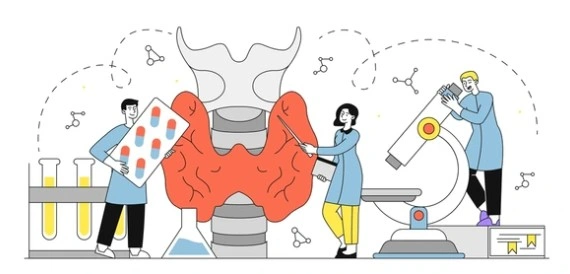
Gut-Thyroid Axis
As we learn more and more about the microbiome, we are starting to view the microbiome as part of the endocrine system. The endocrine system are glands and organs that use hormones as messengers to coordinate organ function. The microbiome, it appears, is capable of sending hormone-like messages that impact normal physiology and chronic disease. In particular, research is investigating how the microbiome and thyroid interact. It is important to note this is a two-way street — the thyroid impacts the gut (and indirectly the microbiome) and the microbiome impacts the thyroid.
Thyroid impacts on gut
Thyroid hormones are crucial to the health of the cells lining the gut (intestinal epithelium). Their growth and function are strongly influenced by thyroid hormones.
Thyroid hormones also influence the expression of intestinal alkaline phosphatase, which is important for defense of the intestinal mucosa1. It can help to reduce the absorption of lipopolysaccharide (LPS) produced by gram negative bacteria which can be inflammatory. Reduced levels of intestinal alkaline phosphatase may result in reduced diversity of the microbiome.
Research in mice indicates that thyroid hormone may influence digestive enzymes and thereby impact absorption of nutrients1. Improperly digesting or absorbing food can lead to downstream imbalances in the microbiome.
Thyroid hormones also influence intestinal transit time, which is why constipation is a common symptom of hypothyroidism1.
Gut conversion of thyroid hormones
While thyroid hormones strongly impact the intestinal epithelium, the intestinal epithelium can also impact thyroid hormones. To understand this, it is important to note that there are different types of thyroid hormones. The main thyroid hormone released by the thyroid is T4, which is not able to send messages to cells about energy, growth, metabolism, etc. T4 has to be converted to T3. Intestinal cells do express the enzyme to convert T4 into T32. While this activity doesn’t impact the thyroid itself, it does impact how the body is handling and responding to thyroid hormones, which can be significant for symptoms.
Microbiome impacts on thyroid hormone metabolism3
In order to get rid of thyroid hormones, your liver will attach a few molecules to thyroid hormones to deactivate it and then put it in the bile so it will be released into the intestines and eliminated through the feces. However, some bacteria produce enzymes that can remove what the liver attached to reactivate thyroid hormone. This can be reabsorbed into the bloodstream (where it will be taken back to the liver). This process is called enterohepatic recirculation and may result in higher levels of thyroid hormones. The enzymes involved are bacterial sulfatases and bacterial ß-glucuronidases. Please note that 16S rRNA sequencing cannot assess the activity of these bacterial enzymes. PCR targeted to these genes or metagenomic sequencing would be able to assess these genes, but it would still not tell you how active these enzymes actually are.
Microbiome impacts on the thyroid
The majority of the research on the gut-thyroid axis has focused on the role of the microbiome in autoimmune thyroid disease. The majority of thyroid issues are caused by autoimmune thyroid disease (Hashimoto’s or Grave’s) and we already know that the microbiome has a huge impact on the immune system. So this makes sense. The research has not been consistent or conclusive. Some studies have shown lower diversity in Hashimoto’s compared to control while others have shown higher diversity1. Some studies show high Prevotella, other studies show low Prevotella1.
After specializing in Hashimoto’s and the microbiome in clinical practice for almost a decade, here is what I can tell you. There is no one bacteria that “causes” Hashimoto’s. I think trying to pinpoint one or even a handful of bacteria for a specific disease is missing the entire point of the microbiome —it is a complex ecosystem that is dynamic and influenced by a variety of factors. With that said, the most clinically significant microbiome imbalance for Hashimoto’s, in my opinion, is small intestine bacterial overgrowth (SIBO). Not all Hashimoto’s patients have SIBO, but many do. I consistently see thyroid antibodies decrease or even go into remission after treating SIBO. So this is often where I start with Hashimoto’s patients depending on their symptoms. I use a 3 hour lactulose breath test, though some doctors prefer a glucose test. Please note that 16S rRNA sequencing of the large intestine microbiome provide absolutely no data about SIBO, including bacteria that may be involved.
In the large intestine microbiome, I may often find high Proteobacteria and low butyrate producers. Correcting these imbalances may result in decreases in thyroid antibodies but not always. I also may see TSH decrease while T3 increases and reverse T3 decreases in these cases as well. For some of these patients, we have been able to decrease thyroid medication after modulating their microbiome, but not all patients respond this way.
Research also suggests a correlation between Blastocystis hominis and Hashimoto’s4. Clinically, I don’t find this too commonly and I haven’t noticed improvements in GI symptoms or thyroid markers after treating. Some research indicates Blastocystis may be commensal and its virulence may depend on the specific strain, which may explain the lack of positive results I have experienced. Parasites like Blastocystis cannot be assessed through 16S rRNA sequencing. The standard of care for parasite testing is microscopy (Ova & Parasite) but this is not always accurate. I would recommend a PCR test on a pool of 3 different stool samples, ideally with subtyping of Blastocystis if positive.
References
- Fenneman AC, Bruinstroop E, Nieuwdorp M, van der Spek AH, Boelen A. A Comprehensive Review of Thyroid Hormone Metabolism in the Gut and Its Clinical Implications. Thyroid®. 2023;33(1):32-44. doi:10.1089/thy.2022.0491
- Knezevic J, Starchl C, Tmava Berisha A, Amrein K. Thyroid-Gut-Axis: How Does the Microbiota Influence Thyroid Function? Nutrients. 2020 Jun 12;12(6):1769. doi: 10.3390/nu12061769. PMID: 32545596; PMCID: PMC7353203.
- Peeters RP, Visser TJ. Metabolism of Thyroid Hormone. In: Feingold KR, Anawalt B, Blackman MR, et al., eds. Endotext. MDText.com, Inc.; 2000. Accessed April 30, 2024. http://www.ncbi.nlm.nih.gov/books/NBK285545/
- El-Zawawy HT, Farag HF, Tolba MM, Abdalsamea HA. Improving Hashimoto's thyroiditis by eradicating Blastocystis hominis: Relation to IL-17. Ther Adv Endocrinol Metab. 2020 Feb 21;11:2042018820907013. doi: 10.1177/2042018820907013. PMID: 32128107; PMCID: PMC7036484.
